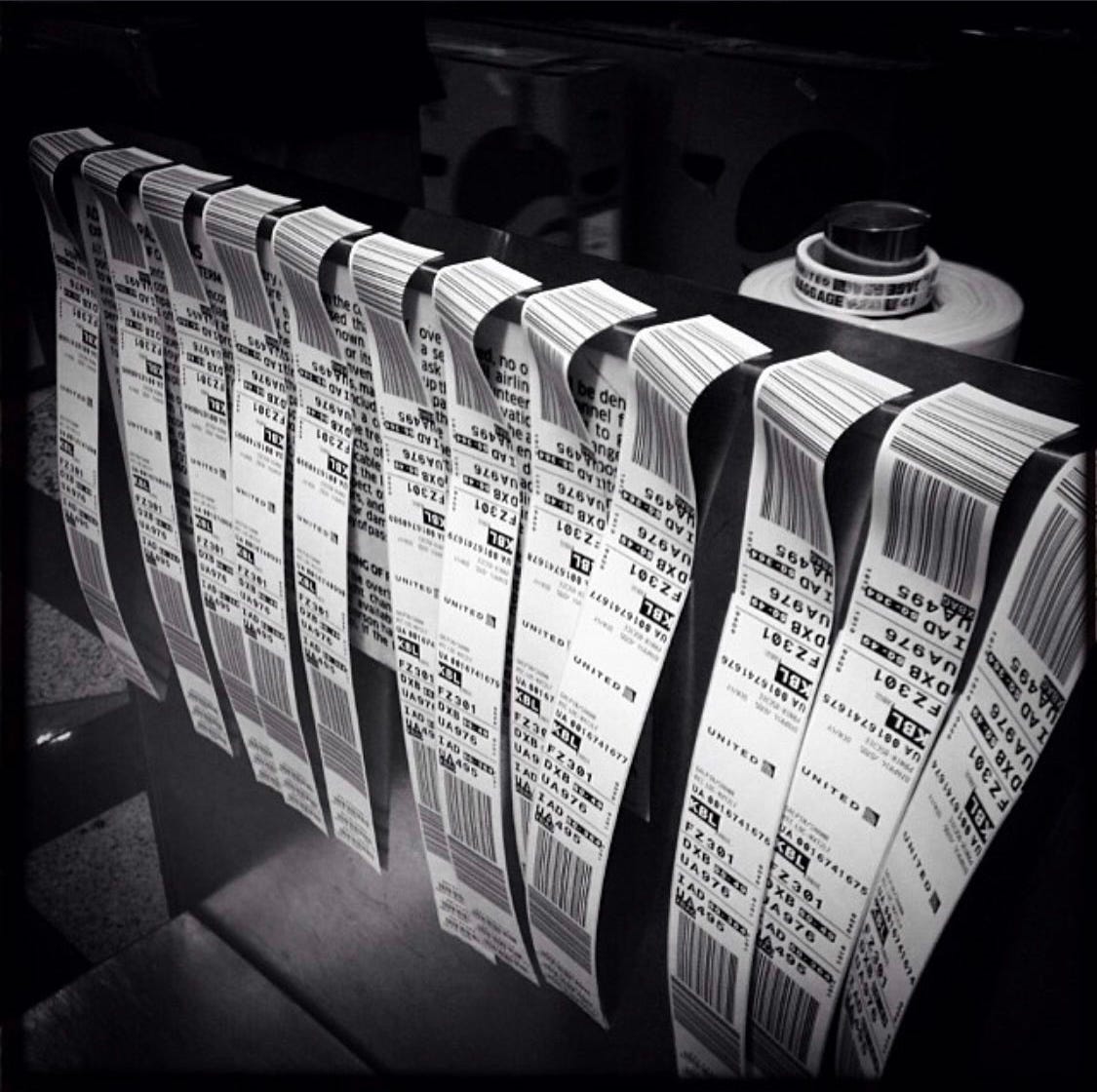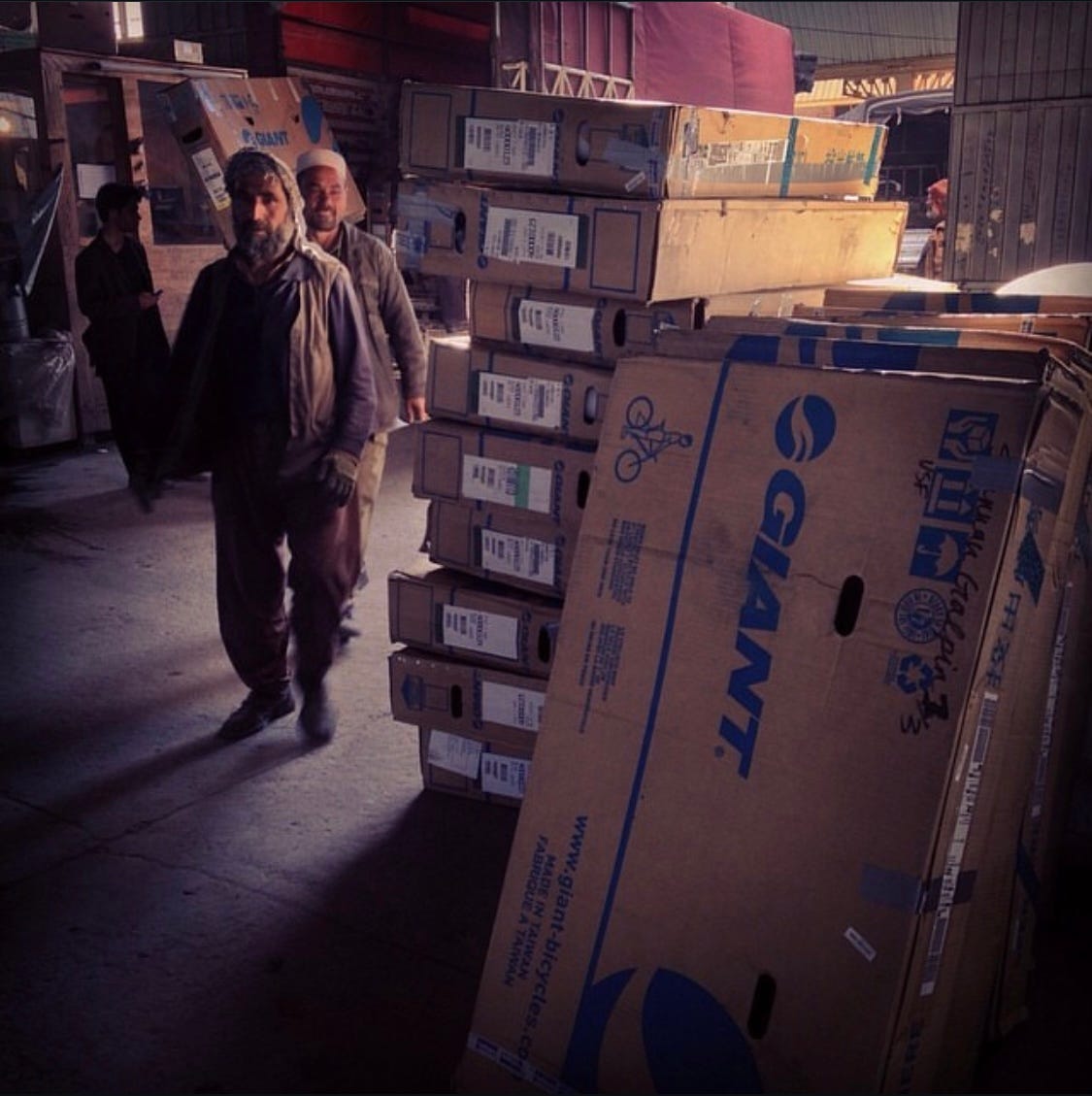
Eleven years ago, I flew to Kabul with sixty-three racing bikes and several hundred pounds of cycling equipment, clothing, and gear. An ambitious endeavor no matter where you are traveling, but bringing racing bikes to a women’s cycling team in Afghanistan felt audacious and a tiny bit ridiculous. I embraced the ridiculousness of the project.
My sister and daughter drove with me to the Denver airport in a rented Uhaul truck. We rocked up to the United Airlines passenger drop-off. We started unloading with a group of volunteers who met us there. The ticketing desk agents were aghast when we began filing in with bike boxes and the pile kept growing. 63 bikes plus extra boxes and bags bound for where? Kabul.
“Why are you bringing sixty-three bikes to Afghanistan?” asked more than one airport agent.
“Well, I’m supporting the first Afghan women’s cycling team,” I’d begin, “and they need bikes.”
Denver-DC-Dubai-Kabul.
Four cities, three flights, and ten and a half times zones later, and incredibly, all of the bike boxes, bags, and my own personal luggage arrived on the other side. Much to the amusement and amazement of the Kabul airline staff. The bike boxes overloaded the luggage conveyor belt, and they soon spilled out onto the floor while arriving passengers watched in detached fascination.
Luckily, several young men on hand to assist as porters stepped in to sweep up the chaos. One of them recognized me from previous visits and smiled, gesturing to the ocean of bike boxes.
“Salaam Alaikum, Bike Lady!"
I laughed. Geez, come through a few times with a bike box and no one forget you. “Salaam Alekum.”
“These are all for you?” he asked.
“Yes, please,” I smiled back, my right hand on my heart as a combined gesture of gratitude and greeting.
He waved and called out to a couple boys on the other side of the room. They grabbed trolleys and started stacking boxes. Each trolley could fit 6 bikes. I estimated we’d need 11 trollies for everything we had, we could carry our luggage ourselves. But somehow, they stacked the boxes like Jenga towers and confidentially rolled them toward the security exit.
I knew that each box would have go through the xray machine. This was going to get messy.
Before the unloading process could begin, one of the security agents approached us.
“What is all of this?” he asked, looking at me.
“These are bikes donated for the Afghan Cycling teams.” I hesitated, unsure if admitting these were for women cyclists would help or hinder a smooth exit.
“Do you have the receipt for these bikes?” He looked at the matching boxes. I understood, he assumed these were all new bikes, most likely for reselling.
“No, these are all donated bikes. Not for resale. I am bringing them for the teams in Kabul and Bamyan to use. Both boys and girls, who are training for races to represent Afghanistan.” I held my breath.
“This is good, our young people need sport.” he nodded. “But you need a receipt even for donated items.”
“But, I didn’t need a receipt during my last visit.” I had brought seven bikes plus 500 pounds of second-hand donated cycling clothing on my previous visit exactly the same way.
“I remember you. But you only had five or six bikes, yes?” he explained.
I nodded. “Yes, that is right.”
“Yes,” he smiled. “And, if I remember, you didn’t travel alone?”
He did remember me. That was true; I had brought a film crew and a photographer to document the women’s team, and four women had arrived with me. Five women, seven bikes, ten more boxes, luggage. I understood how, in his eyes, that was more evenly distributed. I nodded my agreement.
“This,” he waved towards the towering stacks of bike boxes, “is a different.”
I smiled. He had a valid point. To be fair, I knew this was ridiculous. I was shocked I hadn’t been given a more difficult time in Denver. I simply paid the bike baggage fee for every bike and they tagged and loaded them on without any hassle. I was seventy percent sure that he wasn’t trying to shake me down or be an asshole. But it was clear that my bikes had caused a scene and that protocols must be followed. I was annoyed. I couldn’t bring a typical receipt because if the full value was listed, I definitely would be slapped with a large customs tax. These were donated, so I needed a receipt illustrating their value at zero. I should have had Giant Bicycles and Liv Cycling write up a donation receipt on their letterhead for me to travel with, listing the bikes, the purpose of the donation, and placing their value at zero. But I had come through the Kabul airport customs so often that I hadn’t thought about doing this any differently.
“You can take your luggage, but the bike boxes will go to the customs house. You just need a letter from the Afghan Cycling Federation stating that they accept the donation and that you should get the customs agents to sign off. You can pick up the bikes once you have the letter and the signatures.”
I inwardly groaned; I feared this could take weeks, and someone, or multiple someones, would expect me to pay a boatload of money for the bike release. I had plans to get the Afghan National Women’s Team to Bamyan the next weekend for their first training camp. But there was no sense in arguing, he was being as reasonable as I could expect a customs agent to be. I wasn’t going to be leaving the airport with the sixty-three bikes.
Three days later, armed with a letter from the President of the Afghan Cycling Federation and a stack of papers I had collected and had signed and stamped by numerous staff inside the customs house, I went to the customs house airport office to deliver my plea for release. I still didn’t fully understand what had gone on over the previous two days. I had waited in more than a dozen offices with my translator, Najibullah, to get forms signed and stamped. Each new signature required a new form to be signed by someone else, which required more waiting. I couldn’t figure out what any of it meant. Someone had determined that this growing stack of documents equaled the freedom of our bicycles.
As incredible as it was to see all the bike boxes arrive on the conveyor belt in Kabul, I was just as surprised to see that they all safely departed the customs house. I could not believe that we had not ‘lost’ one single bike in this circuitous, chaotic journey. I had rented a truck which waited just outside the gates, slowly we filled it up and I breathed a sigh of relief. The bikes had arrived in Kabul!
Now, the hard part….I had sixty-three bikes to build.
**This is a short excerpt of the upcoming A Revolution on Two Wheels - a story about the history of Afghan women’s cycling and their year-long evacuation. The decade of the women’s right-to-ride movement includes stories of the original team members and organizers, written by the only woman to have spent years riding with and supporting the different teams. Shannon Galpin worked in Afghanistan for a decade. She began mountain biking in Afghanistan in 2009, wrote two books about Afghanistan, and produced a feature-length documentary, Afghan Cycles, about the first Afghan women to cycle while supporting and training with the teams and clubs for several years. When the Taliban walked into Kabul in August 2021, she spent three years evacuating, safeguarding, and resettling the cyclists, journalists, and human rights defenders.





Enjoying reading these, Shannon. Will share your Substack
An insight to the trials of donations which become an opportunity to collect money when they reach their destination. A truly humongous bike drop! ❤